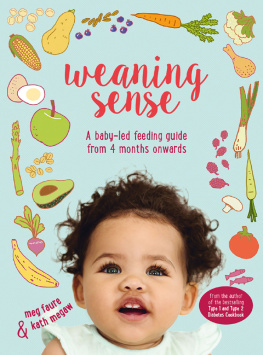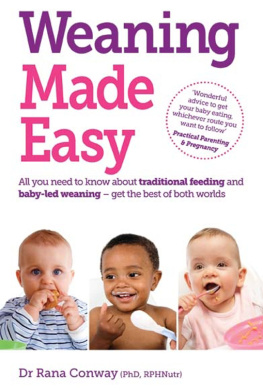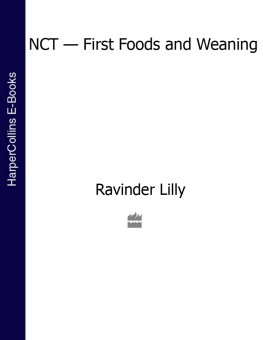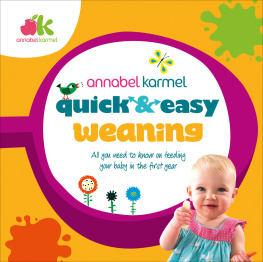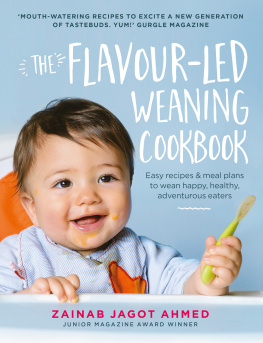Contents
Guide



contents

Foreword
It was the best of times, it was the worst of times, it was the age of wisdom, it was the age of foolishness, it was the epoch of belief, it was the epoch of incredulity, it was the season of light, it was the season of darkness, it was the spring of hope, it was the winter of despair.
While the above quotation is attributed to Charles Dickens A Tale of Two Cities, and is referring to the times before and during the French revolution, the quotation itself could also be referring to the turmoil and uncertainty that surrounds the practice of infant/child weaning today. On the one hand, we live in the age of wisdom, yet on the other, the age of foolishness. It is into this paradoxical climate that Kath and Meg have applied some weaning sense.
I have known both Kath and Meg for some time, both personally and professionally, and have come to witness firsthand their passion and deep-seated desire to help and offer clarity to stressed parents and their children. Both Kath and Meg possess a wonderful caring manner and, in both their practices, they are able to impart such truth in a practical and clear way. On the topic of weaning, society has become a victim of consumerism and convenience busy lifestyles and a disconnectedness in family life have spawned the picky eating epidemic. It is against this backdrop that Kath and Meg have structured a practical and innovative framework a collaborative approach aptly called COLLAB weaning. After reading this book, the principles behind the acronym make perfect sense the clarity of thought and the scientific accuracy of knowledge are conveyed in a distinctly practical way. The recipes contained in the book are well thought out and easy to follow.
Unlike the many books already published on the subject of weaning, Weaning Sense is that one that will empower parents to approach mealtimes with confidence instead of dogma, the principles contained in their approach create a greater understanding of each child as an individual. Children are not all the same whether they are social butterflies, slow to warm up, sensitive or settled, Kath and Megs new approach will equip parents and caregivers to wean with greater understanding and insight.
As a paediatrician in private practice for some years now, the importance of optimal nutrition in the first 1001 days has become an increasingly important topic. More so now than ever before, the incidence of lifestyle diseases like obesity, diabetes, ADHD and constipation, to mention a few, is reaching epidemic proportions. This is a global problem and for that reason, I am eternally grateful to Kath and Meg for taking the time to bring out this book. Too much has been written and too much has already been said with little/no scientific thought or evidence. Anecdotes abound and the marketers flourish, and all this happens while the picky eating epidemic simply escalates. Weaning Sense can change all that.

Dr Ashley Wewege
MBChb (UCT), FCPaed (SA), MBA (UCT)
Specialist Paediatrician
Fellow of the College of Paediatricians of South Africa

The start of your childs food journey, parenting the whole child
Helping families nourish their children is more than our daily work: its our daily love. To know that a fussy toddler is exploring new foods or that a stressed mum has found peace with how much her little one eats is what makes us tick. We are Kath Megaw, paediatric dietician, and Meg Faure, occupational therapist two mums whose lifes work is helping parents on their journey and that includes the path to happy, healthy family mealtimes. Most importantly, we are parents like you, who are invested in raising healthy eaters despite living in a fast-food world.
The start of your babys weaning journey will have significant implications for your childs health, their emotional world and preventing feeding disorders. Science tells us that the first 1001 days (pregnancy to two years old) has a dramatic impact not only on your childs whole life but on the next generation as well. This is true for brain development a baby needs to be stimulated. It is true for emotional wellbeing a baby needs to be loved. It is true for health a baby needs a nutritious diet. But your babys feeding journey impacts way more than just his health it affects his entire person. It is in pregnancy and for a few years thereafter that you get to have the most powerful impact through what and how you feed your baby.
As a parent, this knowledge brings with it a heavy weight of responsibility. Its no wonder decisions at this time can feel overwhelming. This is never more so than when it comes to weaning. Most parents find the prospect of starting their child on solids a daunting thought because, aside from the long-term implications, there is a lot of conflicting information in the media and coming from experts and other mums.
Mealtimes and feeding a family have changed dramatically over the last 50 years. Convenience foods, busy lifestyles and technology have disrupted the family table, with parents relying on convenience foods and acting as short-order cooks to appease their picky eaters. Family mealtimes occur less frequently, with fewer opportunities for emotional connections and family bonding, due to distractions from technology. Mealtimes, like the rest of life, are becoming disconnected.
Times have also changed when it comes to childrens health. With the decline in home-cooked meals, increased reliance on convenience foods, including packaged foods and fast food, and decreased physical activity, its no surprise that childhood obesity rates are higher than ever. Unfortunately, obesity is just the tip of the iceberg. Many children suffer from other diet-related illnesses, despite a normal BMI. Poor concentration, lack of energy, gastroesophageal reflux, and chronic constipation may all be linked to a poor diet.
The long-term consequences of early feeding experiences play out in the lifestyle diseases of our modern world: obesity, heart disease and diabetes are laying claim to younger and younger children. Yet as a parent, it is often the short-term frustrations that are just as concerning many of the babies we see in our practices are developing typically but are creating high levels of anxiety for their mums as picky eaters.
Why are there so many children with feeding disorders such as picky eating? The picky eating epidemic has been put down to the dramatic rise in food allergies and intolerances as well as an increase in premature births and conditions such as autism. For other little ones its the sensory challenge of exploring new foods that is too much for them. Then there are the emotional battles that are played out at the table, with mum and toddler fighting out the balance of power. Other times, its simply a by-product of double-income families the frenetic chase of lifes busyness or simply mismanagement of the feeding journey.

